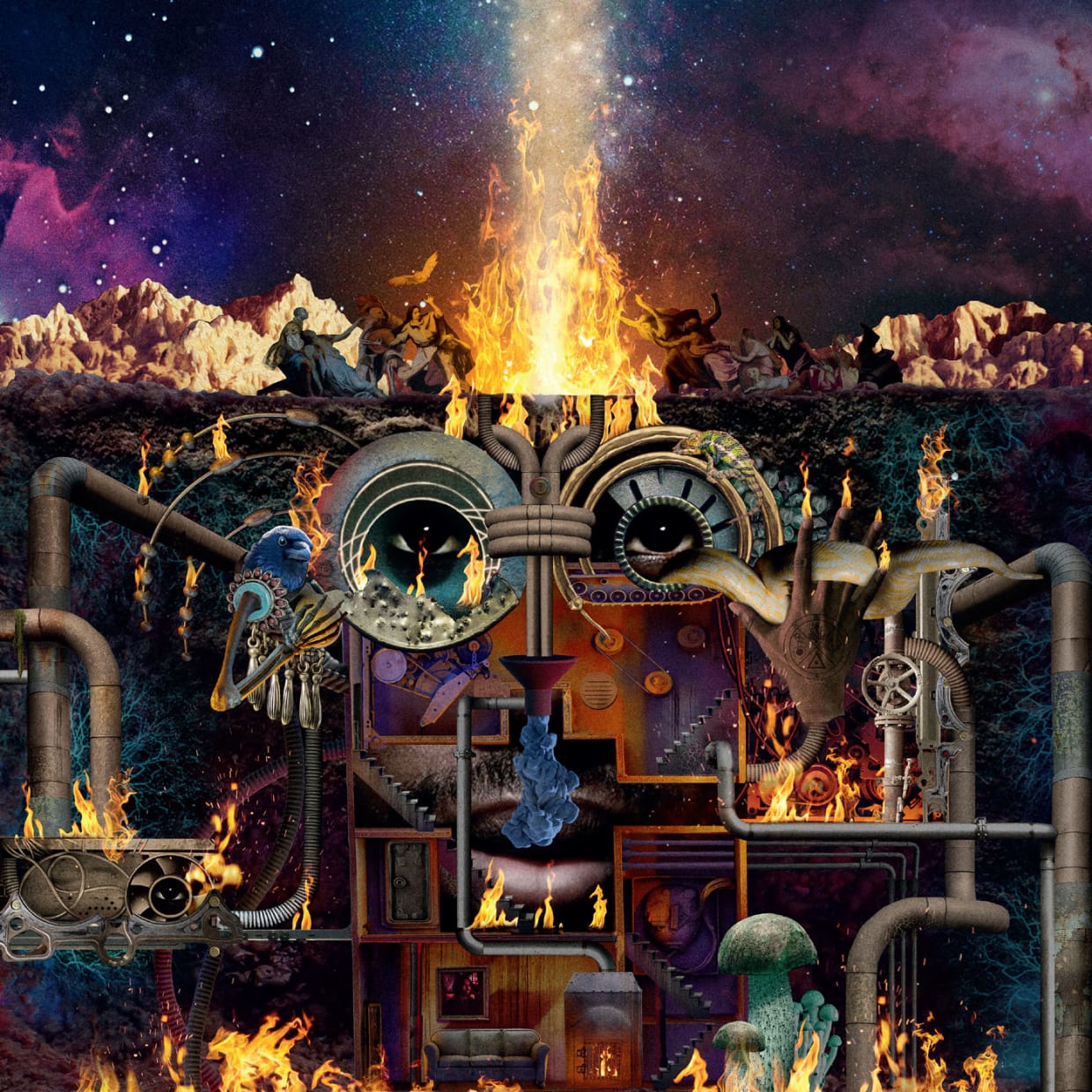Flying Lotus “Flamagra”
Dark, dazzling, and unmistakably FlyLo.

Score: 8.5/10
Just about the greatest compliment you can give to an artist is to turn their name into an adjective. Take David Lynch for example, whose influence is so widespread that calling something “Lynchian” has become a cliché. Paul Woolford’s Bobby Peru project is named after Willem Dafoe’s character in Lynch’s “Wild At Heart.” Dean Blunt and Inga Copeland’s “Narcissist” takes its chords from Julee Cruise’s “I Float Alone,” produced by Lynch and Angelo Badalamenti. Metavari recently released an album of 11 tracks written as scores for Lynch’s short films. Most of all though it’s an aesthetic debt, owed to the director by the likes of Lana del Rey and Sky Ferreira, artists occupying the atmospheres of so-called “dark beauty” and “doomed romance” which works like Twin Peaks made popular.
Flamagra, the sixth studio album from Steven Ellison (a.k.a Flying Lotus), pulsates with Lynchian influence. For starters: a story, of sorts, that Ellison overheard Lynch telling at a party was eventually used for a song, the hellishly brilliant “Fire is Coming.” The story is spoken by Lynch over a trademark bed of FlyLo unease, denoting a striking compatibility between the artistic outlooks of both involved. From “The Man from Another Place” to “Dance of the Pseudo Nymph,” the vocabulary from the two artists’ back catalogs is almost interchangeable. Enjoying their work is a similar experience too, often based on a feeling of not knowing W.T.actualF you’re seeing or hearing, just knowing you can’t possibly turn it off—what you might call an obfuscation aesthetic.
Actually, “aesthetic,” a word I’ve used twice already here, three times now—feels like a bit of a cliché as well, something we all accept because it sounds cool rather than bothering to think about what it means. Such faux-pas—clichés, that is—are hard to avoid when describing Flying Lotus. Flamagra is concerned with death and the cosmos, even more psychedelic and dreamlike than anything he’s done before: to anyone playing FlyLo cliché bingo, there’s four points already.
In search of an original critique, the main difference between Flamagra and any other FlyLo album is length: at nearly 70 minutes, it’s 20 minutes longer than anything else he’s done, and all the better for it, as some FlyLo albums seem to end rather too quickly. By contrast, Flamagra is wonderfully un-rushed, including somewhat ponderous, in-between tracks (like “Heroes in a Half Shell,” “Debbie is Depressed” and “FF4”) which might have been cut in a harsher edit, but which lend the album a spacey freedom, the mark of a producer now supremely confident of holding a listener’s attention.
He does so most unerringly in the album’s latter half, beginning with “Fire is Coming,” which acts as Flamagra’s smouldering centrepiece. From then on, Ellison lifts us skywards, marching us up double-time basslines like crumbling spiral staircases, winding escalators to the stars where gravity seems to disintegrate along with any memory of the real world. The album’s longest sequence without the sound of a human voice, five tracks beginning with “Andromeda,” is its deepest dive down the FlyLo rabbit hole, a tumbling trip taking in the weightless “Remind U,” the bizarrely baroque “Say Something,” and finally the sombre “Find Your Own Way Home,” a tribute to the late Mac Miller.
The rapper’s death is one of many real-world events to have occurred in the five years since Ellison’s last album, You’re Dead!—not that the real world has much impact on FlyLo. I’d be hesitant to call his music escapist, because that would imply a direct escape route, between this planet and the FlyLo universe. Instead, Flamagra is completely removed from our world, our dimension even, a fantasy accessible only through a combination of space travel and psychedelic drugs.
“Yellow Belly,” for instance, is only escapist in the way the Saw films are: Tierra Whack, who features on the track, is like a character in a horror film, trapped inside FlyLo’s through-the-looking-glass vision. The currently red-hot rapper plays a mad hatter, tripping on DMT and helium while jabbering on about spies, visas, diarrhoea, Aaliyah, tiddies, and condoms. As far as I can tell, it’s gibberish (or um, mumbo jumbo), harder to make sense of than “Mulholland Drive,” but it’s also maddeningly addictive—one of the best verses of the year.
Ellison’s ability to cast A-list actors in his visions is another skill he shares with Lynch. Flamagra’s two best pop tracks, “More” and “Spontaneous,” featuring Anderson .Paak and Little Dragon’s Yukimi Nagano respectively, turn their attendant vocalists into goggle-eyed characters in FlyLo’s elaborate fantasy. Paak rides every bassline on the cracking point of his husky voice, flitting constantly between singing and rapping. Nagano, who has experience inhabiting made-up worlds, is equally brilliant, her VHS voice flickering in and out of FlyLo’s frequency. Neither are quite as dazzling as You’re Dead!’s “Never Catch Me”, featuring Kendrick Lamar (then again neither are many songs this decade), but they’re not far off.
Yet the album as a whole is at least as good as anything we’ve heard from Ellison (I’ll stop short of “best yet,” as FlyLo albums tend to grow on you like the lizard baby in “Eraserhead”). Even more than a Lynchian album, Flamagra is nothing if not a FlyLo album. As usual he lends himself to superlatives and clichés, the sign of a singular artist (there’s another) about whom there just aren’t that many descriptors. The best I can give is that well, it sounds like a Flying Lotus album. That’s not to say it’s predictable—if it was I’d have written it myself. Instead, it’s sort of predictably unpredictable, twisting and turning in a way that’s unmistakably FlyLo. And that is the greatest compliment of all.
Flamagra LP lands May 24 via Warp Records.

